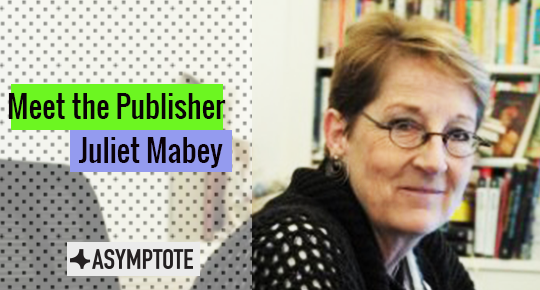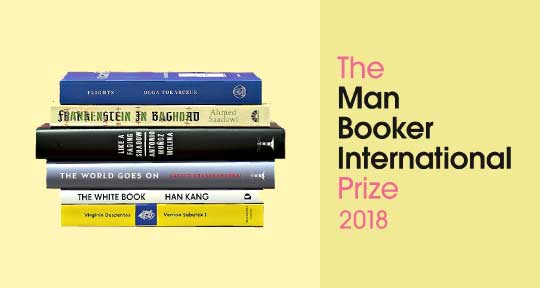“A good reader, a major reader, an active and creative reader is a re-reader,” Vladimir Nabokov reminds us in his article “Good Readers and Good Writers”. There are so many books in this world, and unless your life revolves solely around books, it might be hard to be widely read and an active re-reader. Attaining this level of perfection that Nabokov describes is impossible, but the idea of re-reading as a tool to better understanding the value of a book underpins the philosophy of the Man Booker Prize International’s judging panel since its inception.
Posts featuring Ahmed Saadawi
Meet the Publisher: Juliet Mabey on Oneworld’s Roots and the Business of Publishing Translations

When you start fresh, you’re not burdened with a big list to look after that perhaps stops you from spotting these little gems...
Oneworld was founded in 1986 by Juliet Mabey and her husband Novin Doostdar. The press is now based in London and publishes over 100 books a year. Most of these continue to be non-fiction titles across a broad range of subject areas. In 2009, Oneworld launched their fiction list, and shortly thereafter began releasing novels in translation. To date, the press has published authors from 40 countries and works originally written in 26 languages. Asymptote’s Editor-at-Large for Argentina, Sarah Moses, spoke to Juliet Mabey over Skype to discuss the importance of reading fiction from across the globe and Oneworld’s commitment to diversity in publishing literature in translation.
Sarah Moses: Can you tell me a bit about how Oneworld came to be?
Juliet Mabey: My husband Novin Doostdar and I had always been interested in books and bookshops. We were in university in Edinburgh together, where we met and got married, and we decided that we wanted to set up a company ourselves. It was really a choice between setting up a bookshop or a publishing company. In fact, originally we wanted to set up both, but we never really had time to do the bookshop. We set up Oneworld in 1986, very much with a view of publishing accessible, authoritative narrative non-fiction across quite a broad range of subjects.
At that time there was no Internet. If you wanted to learn a bit more about psychology, and you went into a bookshop, all you could find were say, the complete works of Freud or an A-level textbook of an introductory nature. So we felt there was a big gap in the market for books that were written by experts or academics but in an accessible style. That was very much what we intended to do, across philosophy, psychology, history, popular science. In fact, it’s still very much the core of our non-fiction list. The first year in 1986 I think we published four books. We then built it up very slowly. Neither my husband nor I came from a publishing background so we learned as we went along and talked to booksellers and that sort of thing.
SM: How did you decide to make the move into fiction?
JM: That’s a really interesting question. There were certain factors that came to a head around the same time. On the one hand, I kept reading novels that I felt were very sympathetic to our kind of ethos in our non-fiction list; that if we had a fiction list, we would be interested in publishing ourselves. But of course we didn’t. That went on for a few years before we took the plunge.
For example, novels like Chimamanda Ngozi Adichie’s Half of a Yellow Sun and Purple Hibiscus offered a very interesting way of learning all about Nigerian culture, its history, and that part of the world. They’re fantastic novels in their own right. They weren’t a worthy introduction to Nigeria at all, but they took you there. That seemed to be very much the sort of thing I would have loved to publish if we’d had a fiction list. By this point we’d been in publishing for just over twenty years. Finally I just thought, you know what, I’m going to tell everybody that I’m interested in starting a fiction list, and we’ll see what happens. So we went to Frankfurt in 2008 and I started telling people, “By the way, we’re hoping to start up a fiction list.”
One of the first novels that was suggested to me was Marlon James’s The Book of Night Women, which we went on to publish the following September, in 2009. That was the start of our fiction list. So we were just incredibly lucky. You know, sometimes it happens. And when you start fresh, you’re not burdened with a big list to look after that perhaps stops you from spotting these little gems that are sitting there, which (in the case of James’s novel) everybody had turned down already because it was written entirely in Jamaican pidgin English. Then his next novel—the second novel we published of his—went on to win the Man Booker Prize in 2015. So it was truly a very propitious start to our fiction list.



From Silly to Deadly: On Shalash the Iraqi by Shalash
. . .key to the humourist’s arsenal is none other than language itself—its malleability, its capacity for aggrandisement and diminishment alike.
Shalash the Iraqi by Shalash, translated from the Arabic by Luke Leafgren, And Other Stories, 2023
Anonymity fascinates and seduces. Endless speculations have circled invasively around who Elena Ferrante “truly” is; Catherine Lacey’s recent Biography of X reckons with erasing a layered past with a single letter of the alphabet; the first season of Bridgerton, the hit Regency-era romance on Netflix, has its narrative engine propelled by the question of Lady Whistledown’s real identity. These instances from the Global North exemplify the allure of mystery, but they fail to account for the stakes of remaining nameless in a political climate where to unveil oneself might be to threaten one’s own safety.
One might, in a moment of facetiousness, think of the eponymous chronicler of Shalash the Iraqi as the Lady Whistledown of Iraq’s Sadr City (or Thawra City, as it is lovingly christened by Shalash). Both issued frequent dispatches from within the epicentre of social disarray, guaranteeing the pleasure of gossip. More importantly, their pseudonymous veneers facilitated a lurid candour that might not otherwise have been possible.
There the similarities end. The respectable circles of upper-crust London did not live in the penumbra of foreign occupation. Nor were they plagued with the constant risk of spectacular sectarian violence, or hampered by a corrupt government that has “thieves, cheats, swindlers, traders in conspiracies” for politicians. It was against such chaos that Shalash released his explosive, timely blog posts, garnering a rapidly expanding local readership despite patchy Internet access in the country. The academic Kanan Makiya tells us, in his introduction, that people were printing out the posts, “copying them longhand,” “bombarding Shalash with questions and opinions.” Even high-ranking cadres could not resist partaking in the fanfare: one official expressed admiration while entreating Shalash not to mock him, for fear of his children’s potential disappointment. Another claimed that upon reading the daily communiqués, he would fall off his chair laughing.
Laughter, perhaps, can always be counted on to forge an affinity, if not a unity, beyond fractures of sect, status, and ethnic affiliation. Iraqis would “drop everything for a good laugh”; they gather in bars and down glasses of arak to immerse themselves in a “great, communal, and nondenominational drunkenness.” Shalash knows this, and abundantly turns it to his advantage. Nothing and no one is spared from the crosshairs of his ridicule, populated by a variegated cast that encompasses sermonisers, soldiers, suicide bombers, and donkeys. A vice-president’s verbal pomposity sounds like “he just ate a few expensive dictionaries and is about to lose his lunch.” A woman about to be married off to an Australian cousin is told, should her fiancé divorce her, “just tell everyone that he’s a terrorist and you’ll have nothing to worry about.” An odious neighbour, eager to save a spot for himself in paradise, proselytises the necessity of voting in the referendum for Iraq’s new constitution: “Don’t you know the going rate for rewards in heaven for helping ratify the constitution? It’s worth a hundred visits to the shrine of the Eighth Imam, and that’s on the far side of Iran!” When the narrator casually uses Google Earth, he is accused of lecherously spying on the women of his residence, sparking off a widespread hysteria—and court case—about the “violation of the morals of the block.” Each instance of mockery is a shard in a wider mirror of collective trauma.
READ MORE…
Contributor:- Alex Tan
; Language: - Arabic
; Place: - Iraq
; Writers: - Abu al-Qasim
, - Ahmed Saadawi
, - Catherine Lacey
, - Elena Ferrante
, - Emily Dickinson
, - Hassan Blasim
, - Kanan Makiya
, - Maya Abu al-Hayyat
, - Shalash
; Tags: - American occupation
, - anonymity
, - arabic literature
, - blogging
, - humor
, - Iraqi literature
, - social commentary
, - US Invasion of Iraq